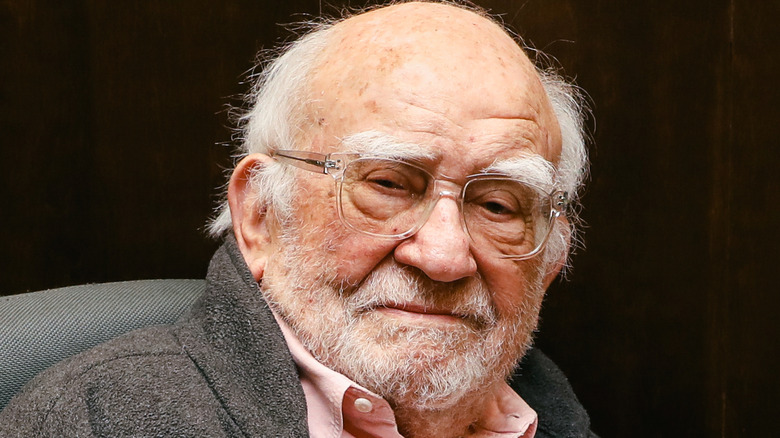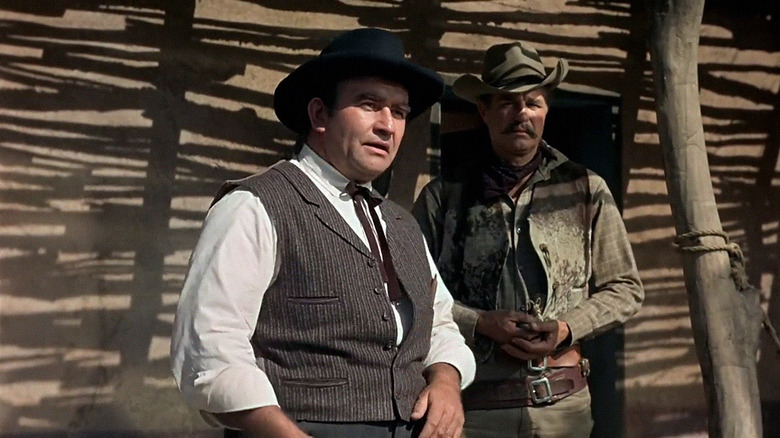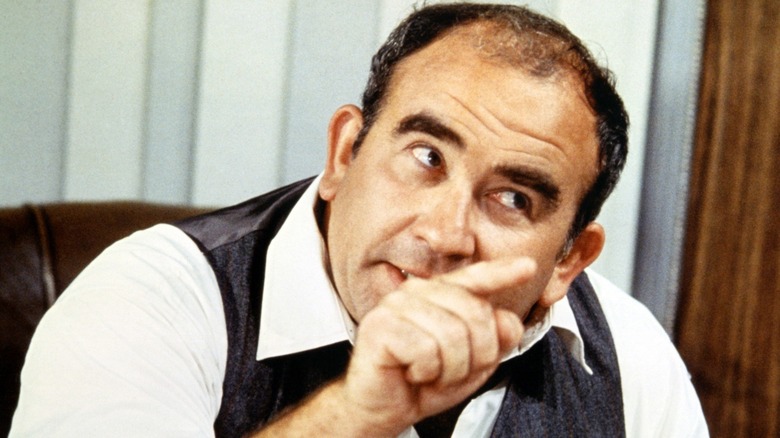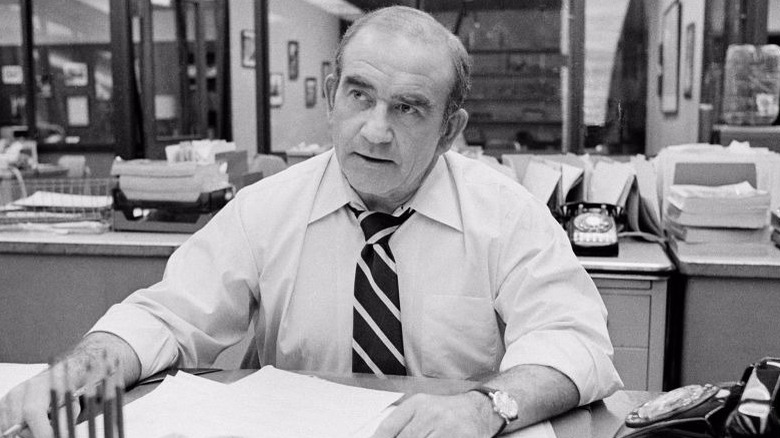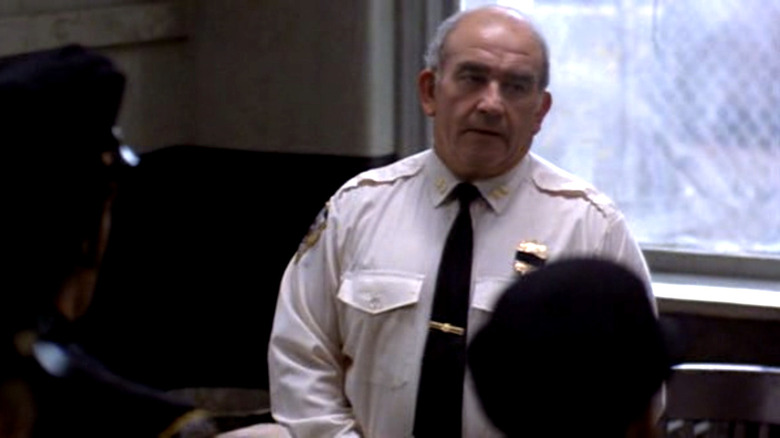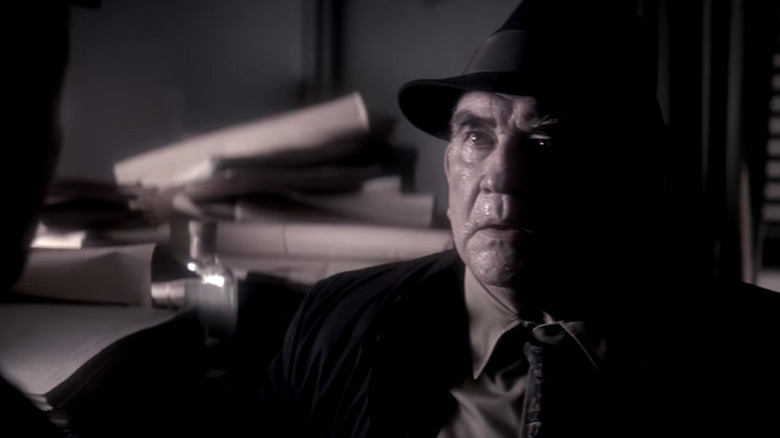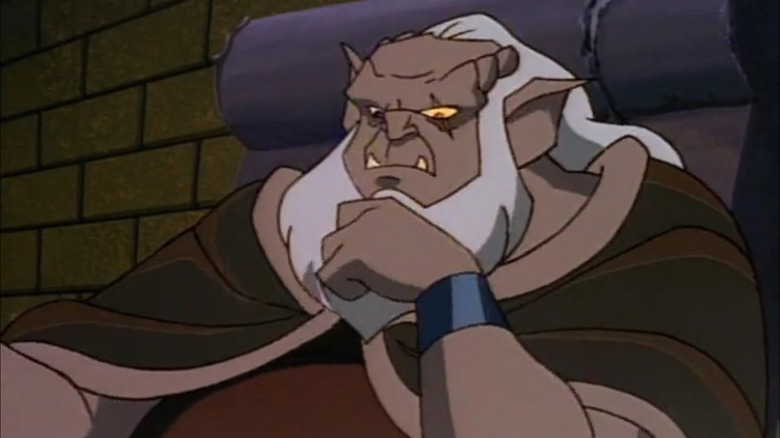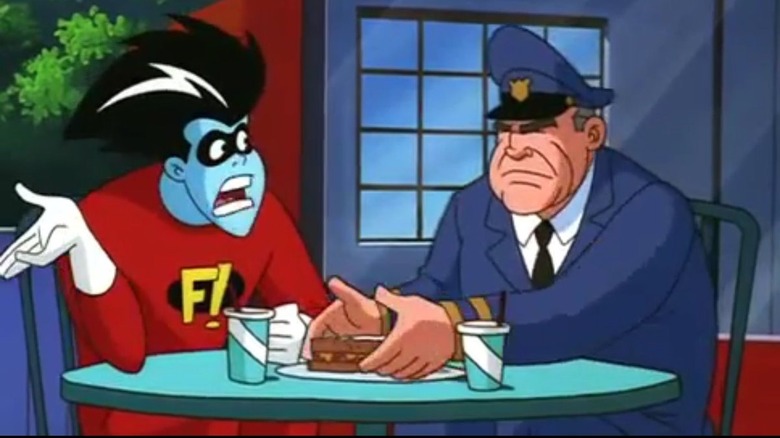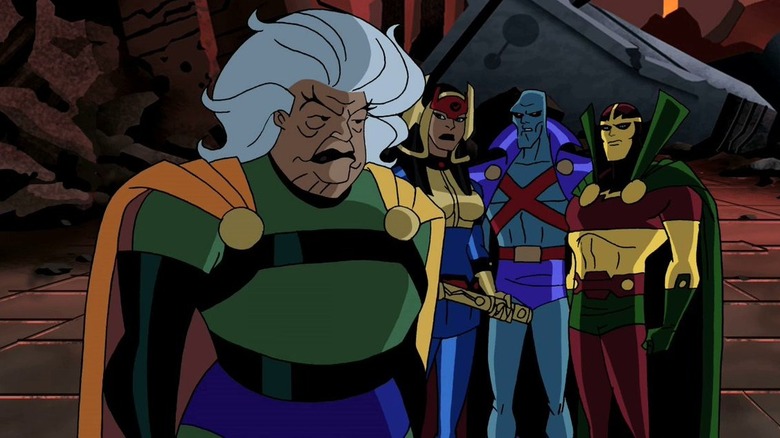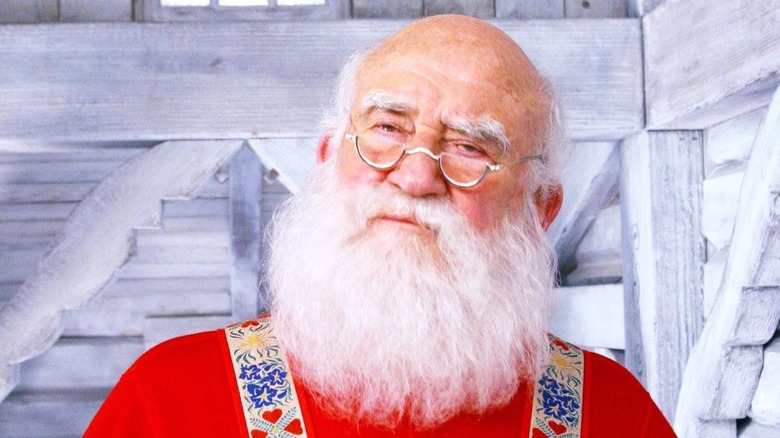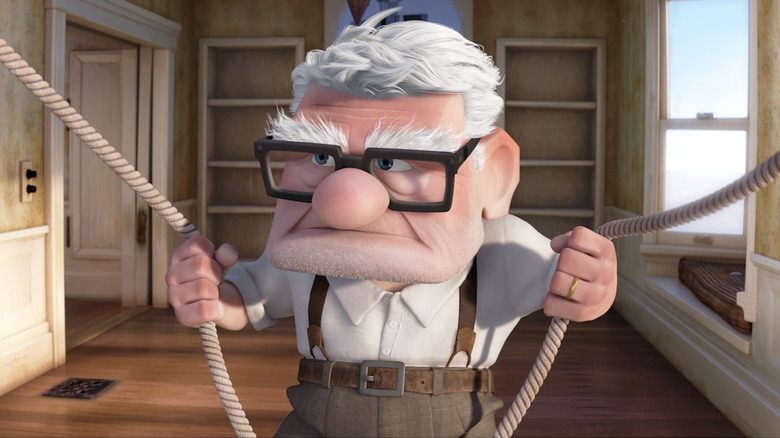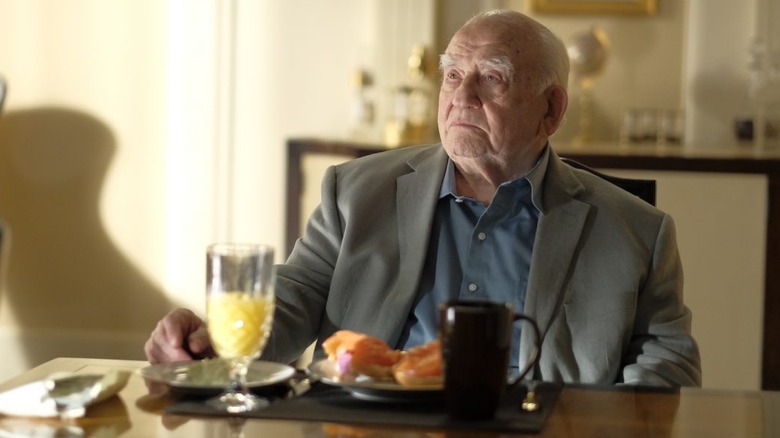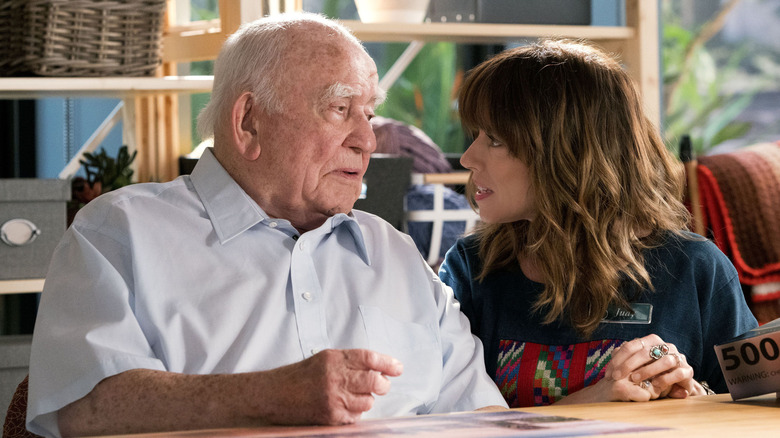Ed Asner's Best Onscreen Roles
When news broke that actor Ed Asner passed away on August 29, 2021, many people who'd never met the man reacted as though they'd lost someone they knew. It's understandable when you realize that the 91-year-old actor had a career that spanned more than 60 years, beginning in the 1950s and working right up until his death. In fact, according to IMDb, Asner has eight more projects still to be released posthumously.
Ed Asner was never really a leading man (well, maybe once or twice), but he was one of the greatest and most likable character actors of all time. With his trademark gravelly voice and a lovable craggy face, Asner is unmistakable whenever he shows up. Whether he's playing a villain, an irascible boss, or Father Christmas himself, Ed Asner brought something special to every part he played. So with that in mind, let's take a look back at the best roles of his long and storied career.
Bart Jason in El Dorado
Although Ed Asner had been working in television and film for nearly a decade, the 1966 Howard Hawks Western "El Dorado" was a ostensibly a landmark moment in his career. John Wayne and Robert Mitchum were the heroes of the film, with a young James Caan in a supporting role, while Asner played the central villain, wealthy landowner Bart Jason. Jason isn't a physically imposing man — which makes the 5'7" Asner perfect for the role — but he uses his wealth to employ a small army of gunslingers. He wants Wayne's Cole Thornton to join that army, but Thornton refuses when he finds out Jason plans to use his resources to muscle the innocent MacDonald family off their land, which has better access to water than his.
Asner doesn't have much screen time as Jason, but the character looms over the entire film. Even when he's not physically around, his criminal empire is ever-present. When he does appear, his gruff manner and direct manner of speech convey that this isn't a guy you want to mess with. Of course Wayne, Mitchum, and Caan help the MacDonalds deal with him by the film's end, but he doesn't go down easy, and he leaves a memorable impression.
Lou Grant on The Mary Tyler Moore Show
One of the most famous roles of Ed Asner's career came in 1970, with the arrival of "The Mary Tyler Moore Show" on CBS. Moore starred as Mary Richards, a young TV news producer in Minneapolis. Asner played Lou Grant, a veteran journalist and her boss. In the first episode, during her job interview, Lou tells Mary, "You've got spunk. I hate spunk" — but he hires her just the same. Lou is usually a grump and a foil for Mary's sunny personality, but ultimately they become close and Grant's inner sensitivity and warmth are gradually revealed.
At the beginning of the series, Lou Grant was married to Edie (Priscilla Morrill), but they separated in Season 4 and eventually got divorced. In the early '70s, both the portrayal of divorce and even just the ongoing changes to characters' daily status quos were both groundbreaking fare for a sitcom. Finding himself newly single in his 40s, Lou begins to date various women as the show goes on, which enables a further evolution of the character beyond just a gruff boss. "The Mary Tyler Moore Show" ended in 1977 after seven seasons, but Ed Asner's time as Lou Grant wasn't over yet.
Lou Grant on the eponymous Mary Tyler Moore spin-off
The series "Lou Grant," named for its star character, was a rare spin-off that existed in a different genre from its source. Lou leaves television and Minneapolis to return to print journalism as the editor of the fictional Los Angeles Tribune, but he also transitions from the lighthearted world of sitcoms like "The Mary Tyler Moore Show" to the more serious realm of the hour-long drama.
Asner's performance evolved to match, with the comically abrasive Lou Grant of "The Mary Tyler Moore Show" giving way to the kind of boss anyone would be happy to have, even if his demeanor was still on the gruff side. The series featured Lou assigning stories to his reporters Joe Rossi (Robert Walden) and Billie Newman (Linda Kelsey), as well as hippie photographer Dennis "Animal" Price (Daryl Anderson). Episodes would then center on the reporting and the local stories that spun out of it, with social issues often a focus.
"Lou Grant" ran for five seasons, ending in 1982, but after 12 years playing the same character, Ed Asner would be closely associated with the role for the rest of his life.
Captain Connolly in Fort Apache, The Bronx
The somewhat confusingly titled "Fort Apache, The Bronx" is a 1981 drama starring Paul Newman as a veteran cop in the South Bronx, one of the most crime-ridden neighborhoods in New York City at the time. The precinct is nicknamed Fort Apache after the famous western cavalry outpost (the subject of a John Wayne film) because the police who work there essentially view it as an outpost in a war zone. Ed Asner plays the precinct's new commander, Captain Dennis Connolly, who takes over as the film begins and has to deal with the broad-daylight murder of two rookie officers in their squad car.
Connolly seems to be well-meaning, but his attempts to "clean up" the precinct are ineffectual. He encourages the cops under his command to arrest more people, even for minor crimes, in hopes of obtaining information on who killed the two cops. This leads to a massive riot, and the murderer (actually an excessive drug user played by Pam Grier) is never caught.
Amusingly, Ed Asner is actually a few years younger than Paul Newman, but you'd never guess it from seeing them in this film. In his mid-50s, Newman can still play an active and physically formidable protagonist, while Asner in his early 50s looks like a veteran commander who has spent years behind a desk. It's a perfect demonstration of the difference between a career leading man and character actor, as Newman and Asner are two of the all-time greatest in those respective categories.
Guy Banister in JFK
Oliver Stone's 1991 film "JFK" is a sprawling epic with a huge cast and a basis on true events, although its conspiratorial implications may go beyond actual history. The film follows New Orleans district attorney Jim Garrison (Kevin Costner), who comes to believe that the assassination of John F. Kennedy was the result of a vast conspiracy and eventually brings charges against local businessman Clay Shaw (Tommy Lee Jones) for his supposed part in that conspiracy. Ed Asner has a small but very memorable role as New Orleans private investigator Guy Banister, a staunch anti-communist who was also alleged to have a role in the conspiracy.
Asner shares an unforgettable scene with Jack Lemon, who plays Banister's employee Jack Martin. The two return to Banister's office from a bar, both extremely drunk, and Banister suddenly becomes paranoid that Martin has stolen some of his files. Banister pulls a gun and pistol-whips Martin with it repeatedly in one of the most menacing and unsettling moments of Asner's onscreen career.
Hudson on Gargoyles
In the 1990s, much of Ed Asner's most prominent work was as a voice actor in TV animation, playing roles such as Roland Daggett on "Batman: The Animated Series" and Hoggish Greedly on "Captain Planet and the Planeteers." Beginning in 1994, he had a major voice role on "Gargoyles," a series about a group of the titular winged creatures who are revived after spending a millennium as stone statues and begin battling evil in New York City. "Gargoyles" had a much darker aesthetic and tone than what Disney was known for, and it soon gained a cult following.
Asner voiced Hudson, the oldest of the gargoyles, who has a gray beard and looks a bit like a gargoyle version of Asner himself. In flashbacks to the gargoyles' early days in medieval Scotland, Hudson is the leader of their clan. He finds himself getting old and having a hard time keeping up, so he steps down as leader and passes the mantle to his protégé Goliath (Keith David). After that, and on into modern times, Hudson continues to serve as a valued advisor to Goliath, and a grandfatherly figure to the younger gargoyles.
Gargoyles ran for 78 episodes over three seasons, with surprisingly complex stories and character development. Although he was a supporting character, Hudson was in some ways the heart of the show, and exactly the kind of gruff-but-warm paternal figure that Ed Asner was by this time legendary for playing.
J. Jonah Jameson on Spider-Man: The Animated Series
Also in 1994, Ed Asner was cast as a veteran newspaperman who was arguably as famous as Lou Grant — but as bosses go, this one was never as likable. J. Jonah Jameson had played a key role in the Spider-Man mythos since the original early-'60s comics, so he would naturally be a part of "Spider-Man: The Animated Series," the most faithful adaptation thus far. Jameson is the publisher of the fictional New York Daily Bugle, a tabloid-style paper with a strong anti-Spider-Man bias.
JJJ believes the wall-crawler is a dangerous criminal, and he uses his newspaper to convince others of that position. At the same time, he unknowingly provides employment to Spider-Man's alter ego, photographer Peter Parker. Jameson is an incredibly overbearing character, always yelling at whoever's in his office at the time and constantly demanding photos of Spider-Man committing crimes (which are hard to obtain, of course, since Spider-Man isn't really a criminal, vigilantism aside).
Asner's gravelly voice is ideal for Jameson, a perfect contrast to the youthful Christopher Daniel Barnes as Peter Parker and the exceedingly smooth-voiced Rodney Saulsberry as Robbie Robertson, Jameson's second-in-command. In fact, Ed Asner was the definitive onscreen J. Jonah Jameson at least until J.K. Simmons took ownership of the role in the live-action movies.
Sgt. Mike Cosgrove on Freakazoid!
Of all the many superhero cartoons that aired in the 1990s (no small number of which featured Ed Asner's voice), "Freakazoid!" is almost certainly the silliest. Produced by Steven Spielberg and created by Bruce Timm and Paul Dini, the same duo behind the DC Animated Universe, "Freakazoid" is about a nerdy teen named Dexter Douglas who becomes the titular zany superhero whenever he says, "Freak out!" Freakazoid (voiced by Paul Rugg) and his entire world are so silly that the show is more than just a parody of the superhero genre — it's an absurdist comedy freely using genre trappings to go in its own weird direction.
Ed Asner voices Sgt. Mike Cosgrove, a police officer who happens to look a whole lot like Ed Asner. At first glance their relationship might resemble that of Batman and Commissioner Gordon, but Cosgrove isn't just Freakazoid's partner in anti-crime: He's just as likely to distract Freakazoid from crime-fighting, showing up in his squad car and inviting the hero to go to lunch, or visit a festival with him, or watch a bear riding a motorcycle. Asner delivers Cosgrove's lines in an exaggerated monotone, which is the perfect contrast to Rugg's manic delivery as Freakazoid. Asner's voice also suits Cosgrove's catchphrase, an always-effective "Cut it out."
Granny Goodness on Superman: The Animated Series and Justice League Unlimited
With his gravelly voice and gruff demeanor, Ed Asner was never the sort of actor you'd expect to gender-bend and play a female character, but there's one memorable exception to that. In four episodes of "Superman: The Animated Series," Asner voiced Granny Goodness, a role he'd reprise in an episode of "Justice League Unlimited" and later in the animated movie "Superman/Batman: Apocalypse."
Created by the legendary Jack Kirby, the ironically named Granny Goodness is a high-ranking henchwoman of the intergalactic warlord Darkseid. Granny runs a so-called orphanage on Darkseid's planet of Apokolips, where she raises children to become his elite soldiers. As such, she's responsible for the upbringing of Big Barda and Mr. Miracle, who would eventually escape to become heroes and members of the Justice League.
As Granny Goodness, Asner does a voice that's more feminine than his usual, but still has just the right amount of trademark sandpaper vocal texture for the monstrous old woman. As strange a casting choice as this was, it's impossible now to imagine anyone else in the role.
Santa Claus in Elf
As both a heavyset older man and a beloved character actor, Ed Asner has actually played Santa Claus several times, in projects that varied from "The Ellen Show" to the animated Christmas special "Olive, the Other Reindeer." His greatest moment in the festive role, however, came in the 2003 holiday comedy "Elf," directed by Jon Favreau. It's the Santa in this movie who accidentally brings a human baby back to the North Pole in his sack, where he's named Buddy and raised by Papa Elf (Bob Newhart).
Buddy, of course, grows up to be portrayed by Will Ferrell and journeys back to New York City to find his human father (James Caan). At the climax of the movie, Santa's sleigh crashes in Central Park, and Buddy and his family have to help Santa get on his way to save Christmas.
In a short time, "Elf" became a beloved holiday favorite, which makes Ed Asner officially a classic cinematic Santa Claus, alongside Edmund Gwenn from "Miracle on 34th Street" and Mickey Rooney from the Rankin-Bass holiday specials.
Ed Wuncler on The Boondocks
It's been a running theme that Ed Asner's animated characters often resemble him, but arguably none have been as closely based on his real-life appearance as Ed Wuncler, the main villain of the Adult Swim series "The Boondocks," based on the comic strip by Aaron McGruder. Wuncler is an incredibly rich businessman who owns most of the businesses in Woodcrest, the suburb where the show takes place. In fact, it was Wuncler's family that founded Woodcrest in the first place.
"The Boondocks," like the comic it's based on, is unapologetically political and deals with themes of race and class. Wuncler is incidentally racist on occasion, but for him everything ultimately comes down to what makes him the most money. He's a character who represents not just wealth but the corruption that comes with it. In fact, there are a lot of similarities between Ed Wuncler and the character that kickstarted Asner's career, Bart Jason. While Asner was known for playing warm and lovable characters, he could manage pure villainy when the project called for it.
Carl Fredricksen in Up
In 2009, at the age of 80, Ed Asner had what might be the best lead role in his entire career in the Pixar film "Up." Asner voices Carl Fredricksen, a retired balloon salesman who's still mourning his wife's death after a wordless tearjerker of an opening sequence that tells the story of their entire relationship. Carl refuses to leave the house he shared with his beloved wife, even as the surrounding area is developed to the point that it's surrounded by skyscrapers. When he's about to be forced out and into a retirement home, Carl rigs his house with thousands of helium balloons, lifting the entire structure off the ground and flying away.
Carl is headed to Paradise Falls, a beautiful spot in South America that he and his wife had always wanted to visit. He's accompanied on the trip by Russell (Jordan Nagai), an 8-year-old Wilderness Explorer who had shown up at Carl's house in an attempt to earn his merit badge for "Assisting the Elderly" and was still on the porch when the house lifted off. Together, Carl and Russell have an adventure involving a giant exotic bird named Kevin (Pete Doctor), a talking dog named Dug (Bob Peterson), and revered explorer Charles F. Muntz (Christopher Plummer) — a childhood hero of Carl's, who turns out to be the villain of the piece.
It's a truly unique story, and it's impossible to imagine anyone other than Ed Asner playing the lovable curmudgeon in the lead role — except maybe Spencer Tracy, a visual basis for the character, but he'd already been dead for 42 years.
Sid Weinberg on Cobra Kai
Sid Weinberg, another of Ed Asner's less likable characters, appears in just three episodes of "Cobra Kai," the 2018 series that catches up with the characters of the 1984 film "The Karate Kid." Nonetheless, he looms large as the apparent source of many of the psychological issues plaguing protagonist Johnny Lawrence (William Zabka). Sid is Johnny's stepfather, who bullied and berated him throughout his childhood. Although this tormentor didn't appear in "The Karate Kid," "Cobra Kai" makes clear that Sid's treatment of Johnny contributed to the violent bully he became as a teenager.
Sid made a fortune as a television producer and resented Johnny for freeloading on that fortune as he partied his way through his 20s and 30s. Before Johnny's mother died in 2002, she made Sid promise to look after him so in the first episode of "Cobra Kai," Sid writes Johnny a check, hoping to end their relationship once and for all. Johnny initially tears up the check, but then he tapes it back together and uses the money to restart the Cobra Kai dojo. After the dojo is successful, Johnny pays Sid back, thus robbing his stepfather of the only hold he still had over him: money. So with just three actual appearances, Ed Asner as Sid Weinberg manages to be one of the most important (and least likable) characters in "Cobra Kai" and Johnny's character development.
Abe Rifkin on Dead To Me
The Netflix series "Dead To Me" is a dark comedy starring Christina Applegate and Linda Cardellini as women who become best friends after being united by tragedy, betrayal, and death. In Season 1, which came out in 2019, Ed Asner is one of the few spots of uncompromised warmth in a dark and chaotic saga.
Cardellini's character, Judy Hale, works at a retirement home. Abe Rifkin (Asner) is one of the residents there, and he becomes her confidante. Judy has pretty obvious problems, but Abe never judges her: He just offers friendship and support. Of course, this makes it all the more devastating when Judy arrives at work one day and learns that Abe has died.
And that's sort of where all of us are since the news broke of Ed Asner's death. Even if we only knew him from TV and movies, Asner felt like an important presence in our lives, audience members across generations can say we grew up with him on our screens (or at least voicing our animated characters). As we say goodbye to Ed Asner, we can revisit any of these characters and feel like he's still with us.
